Healthcare Ethics: Amos's Case, Ethical Issues, and Recommendations
VerifiedAdded on 2020/07/23
|7
|2338
|486
Essay
AI Summary
This essay examines the ethical issues in healthcare through the case of Amos, a high school student denied medical treatment due to not residing in boarding facilities. It analyzes the unethical practices of a nearby hospital, highlighting discrimination, denial of service, and negligence. The essay discusses the importance of respecting autonomy, non-maleficence, beneficence, and justice in medical ethics. It delves into legal and ethical obligations, including the Emergency Medical Treatment and Active Labor Act and the Human Rights Act 1998. The essay provides recommendations for healthcare organizations to prevent similar incidents, emphasizing cleanliness, proper sanitation, strong policies, and adequate medical supplies. The conclusion stresses the need for better handling of healthcare ethics to ensure effective medical service and prevent discrimination.
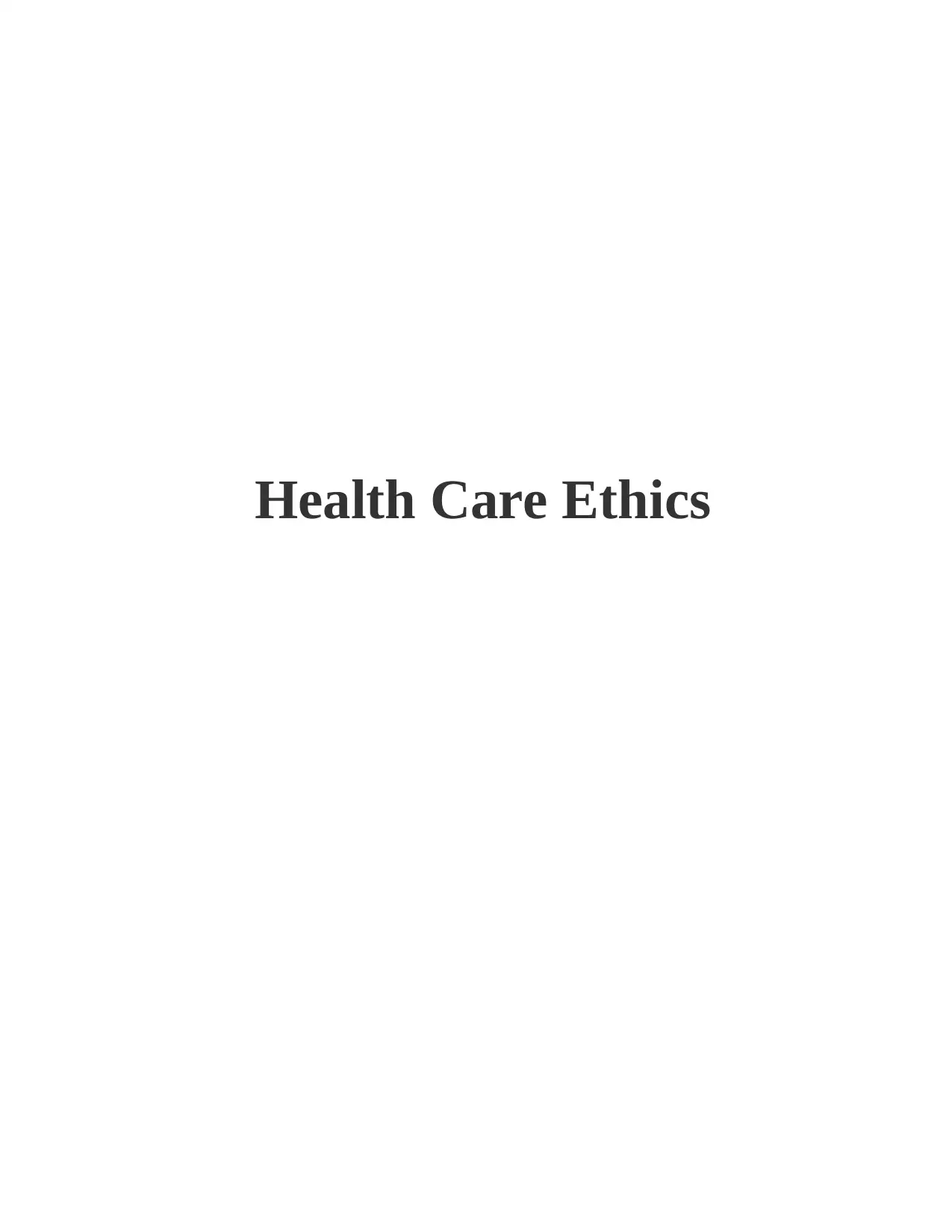
Health Care Ethics
Paraphrase This Document
Need a fresh take? Get an instant paraphrase of this document with our AI Paraphraser
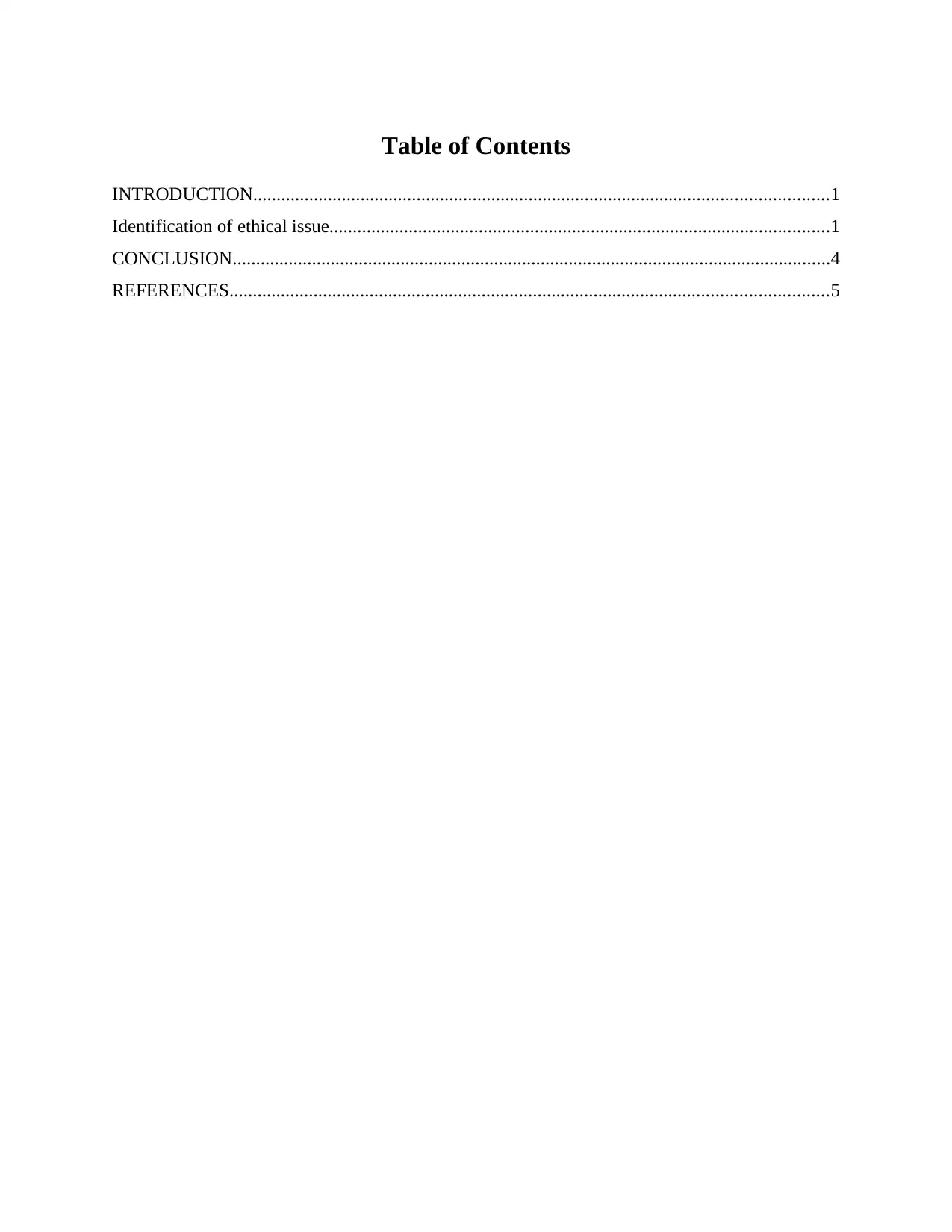
Table of Contents
INTRODUCTION...........................................................................................................................1
Identification of ethical issue...........................................................................................................1
CONCLUSION................................................................................................................................4
REFERENCES................................................................................................................................5
INTRODUCTION...........................................................................................................................1
Identification of ethical issue...........................................................................................................1
CONCLUSION................................................................................................................................4
REFERENCES................................................................................................................................5
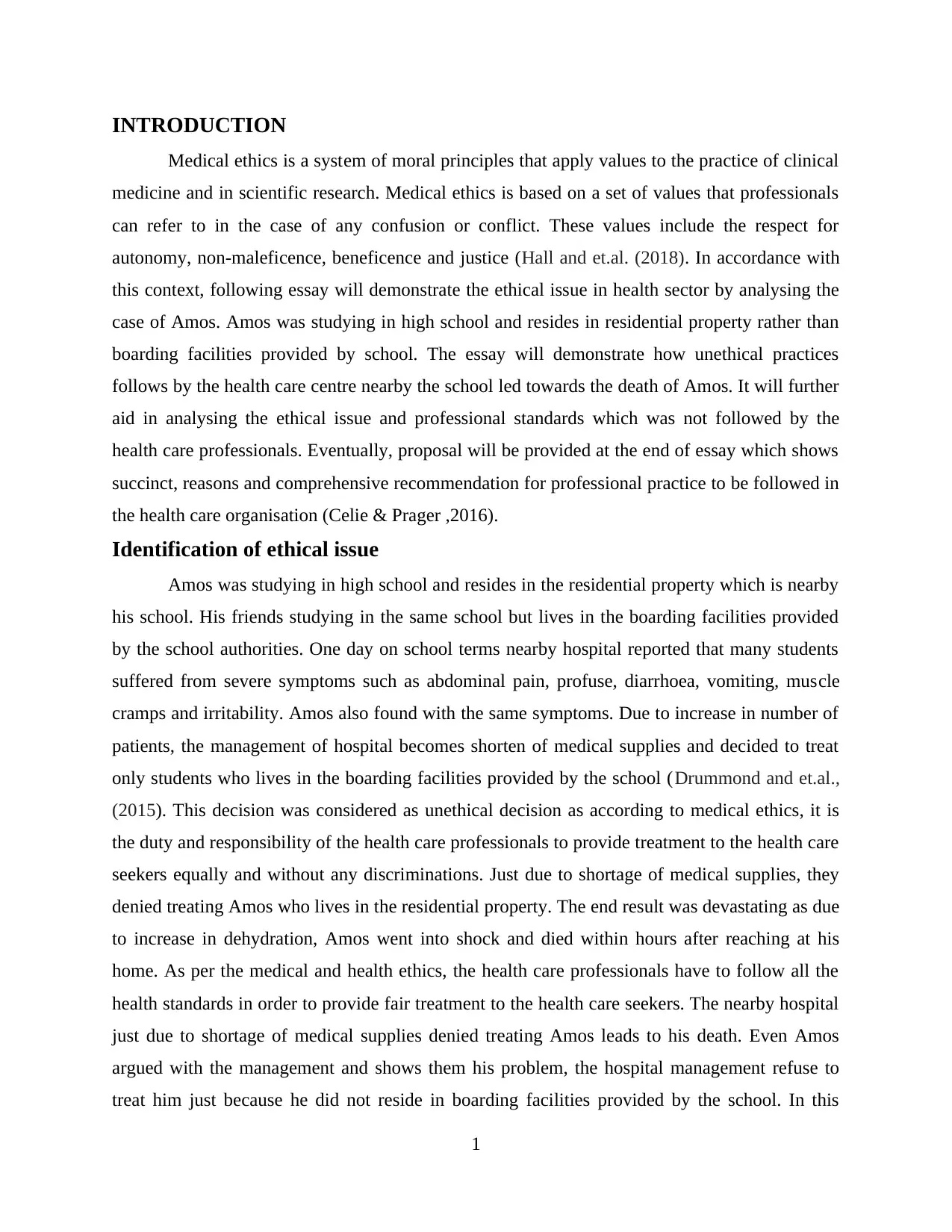
INTRODUCTION
Medical ethics is a system of moral principles that apply values to the practice of clinical
medicine and in scientific research. Medical ethics is based on a set of values that professionals
can refer to in the case of any confusion or conflict. These values include the respect for
autonomy, non-maleficence, beneficence and justice (Hall and et.al. (2018). In accordance with
this context, following essay will demonstrate the ethical issue in health sector by analysing the
case of Amos. Amos was studying in high school and resides in residential property rather than
boarding facilities provided by school. The essay will demonstrate how unethical practices
follows by the health care centre nearby the school led towards the death of Amos. It will further
aid in analysing the ethical issue and professional standards which was not followed by the
health care professionals. Eventually, proposal will be provided at the end of essay which shows
succinct, reasons and comprehensive recommendation for professional practice to be followed in
the health care organisation (Celie & Prager ,2016).
Identification of ethical issue
Amos was studying in high school and resides in the residential property which is nearby
his school. His friends studying in the same school but lives in the boarding facilities provided
by the school authorities. One day on school terms nearby hospital reported that many students
suffered from severe symptoms such as abdominal pain, profuse, diarrhoea, vomiting, muscle
cramps and irritability. Amos also found with the same symptoms. Due to increase in number of
patients, the management of hospital becomes shorten of medical supplies and decided to treat
only students who lives in the boarding facilities provided by the school (Drummond and et.al.,
(2015). This decision was considered as unethical decision as according to medical ethics, it is
the duty and responsibility of the health care professionals to provide treatment to the health care
seekers equally and without any discriminations. Just due to shortage of medical supplies, they
denied treating Amos who lives in the residential property. The end result was devastating as due
to increase in dehydration, Amos went into shock and died within hours after reaching at his
home. As per the medical and health ethics, the health care professionals have to follow all the
health standards in order to provide fair treatment to the health care seekers. The nearby hospital
just due to shortage of medical supplies denied treating Amos leads to his death. Even Amos
argued with the management and shows them his problem, the hospital management refuse to
treat him just because he did not reside in boarding facilities provided by the school. In this
1
Medical ethics is a system of moral principles that apply values to the practice of clinical
medicine and in scientific research. Medical ethics is based on a set of values that professionals
can refer to in the case of any confusion or conflict. These values include the respect for
autonomy, non-maleficence, beneficence and justice (Hall and et.al. (2018). In accordance with
this context, following essay will demonstrate the ethical issue in health sector by analysing the
case of Amos. Amos was studying in high school and resides in residential property rather than
boarding facilities provided by school. The essay will demonstrate how unethical practices
follows by the health care centre nearby the school led towards the death of Amos. It will further
aid in analysing the ethical issue and professional standards which was not followed by the
health care professionals. Eventually, proposal will be provided at the end of essay which shows
succinct, reasons and comprehensive recommendation for professional practice to be followed in
the health care organisation (Celie & Prager ,2016).
Identification of ethical issue
Amos was studying in high school and resides in the residential property which is nearby
his school. His friends studying in the same school but lives in the boarding facilities provided
by the school authorities. One day on school terms nearby hospital reported that many students
suffered from severe symptoms such as abdominal pain, profuse, diarrhoea, vomiting, muscle
cramps and irritability. Amos also found with the same symptoms. Due to increase in number of
patients, the management of hospital becomes shorten of medical supplies and decided to treat
only students who lives in the boarding facilities provided by the school (Drummond and et.al.,
(2015). This decision was considered as unethical decision as according to medical ethics, it is
the duty and responsibility of the health care professionals to provide treatment to the health care
seekers equally and without any discriminations. Just due to shortage of medical supplies, they
denied treating Amos who lives in the residential property. The end result was devastating as due
to increase in dehydration, Amos went into shock and died within hours after reaching at his
home. As per the medical and health ethics, the health care professionals have to follow all the
health standards in order to provide fair treatment to the health care seekers. The nearby hospital
just due to shortage of medical supplies denied treating Amos leads to his death. Even Amos
argued with the management and shows them his problem, the hospital management refuse to
treat him just because he did not reside in boarding facilities provided by the school. In this
1
⊘ This is a preview!⊘
Do you want full access?
Subscribe today to unlock all pages.

Trusted by 1+ million students worldwide
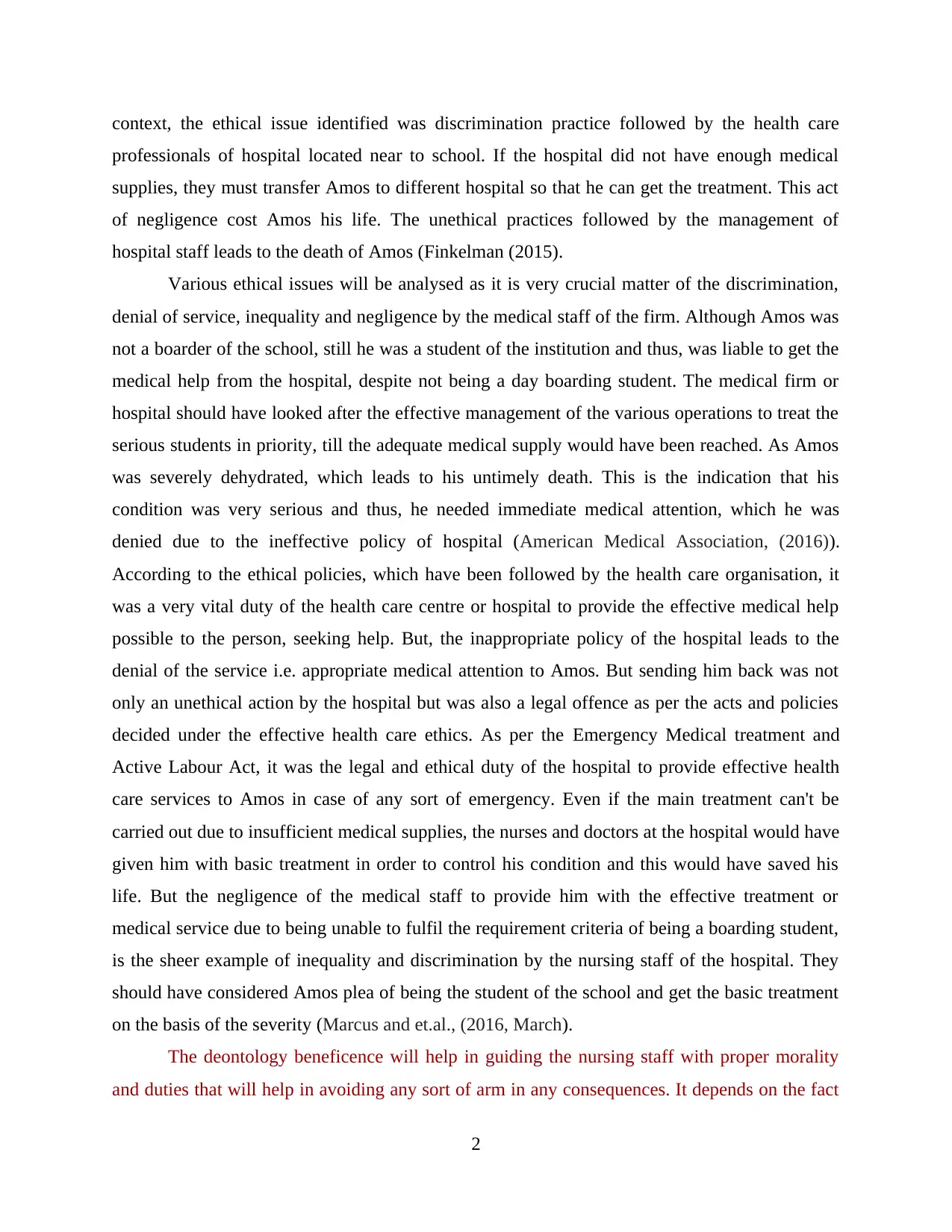
context, the ethical issue identified was discrimination practice followed by the health care
professionals of hospital located near to school. If the hospital did not have enough medical
supplies, they must transfer Amos to different hospital so that he can get the treatment. This act
of negligence cost Amos his life. The unethical practices followed by the management of
hospital staff leads to the death of Amos (Finkelman (2015).
Various ethical issues will be analysed as it is very crucial matter of the discrimination,
denial of service, inequality and negligence by the medical staff of the firm. Although Amos was
not a boarder of the school, still he was a student of the institution and thus, was liable to get the
medical help from the hospital, despite not being a day boarding student. The medical firm or
hospital should have looked after the effective management of the various operations to treat the
serious students in priority, till the adequate medical supply would have been reached. As Amos
was severely dehydrated, which leads to his untimely death. This is the indication that his
condition was very serious and thus, he needed immediate medical attention, which he was
denied due to the ineffective policy of hospital (American Medical Association, (2016)).
According to the ethical policies, which have been followed by the health care organisation, it
was a very vital duty of the health care centre or hospital to provide the effective medical help
possible to the person, seeking help. But, the inappropriate policy of the hospital leads to the
denial of the service i.e. appropriate medical attention to Amos. But sending him back was not
only an unethical action by the hospital but was also a legal offence as per the acts and policies
decided under the effective health care ethics. As per the Emergency Medical treatment and
Active Labour Act, it was the legal and ethical duty of the hospital to provide effective health
care services to Amos in case of any sort of emergency. Even if the main treatment can't be
carried out due to insufficient medical supplies, the nurses and doctors at the hospital would have
given him with basic treatment in order to control his condition and this would have saved his
life. But the negligence of the medical staff to provide him with the effective treatment or
medical service due to being unable to fulfil the requirement criteria of being a boarding student,
is the sheer example of inequality and discrimination by the nursing staff of the hospital. They
should have considered Amos plea of being the student of the school and get the basic treatment
on the basis of the severity (Marcus and et.al., (2016, March).
The deontology beneficence will help in guiding the nursing staff with proper morality
and duties that will help in avoiding any sort of arm in any consequences. It depends on the fact
2
professionals of hospital located near to school. If the hospital did not have enough medical
supplies, they must transfer Amos to different hospital so that he can get the treatment. This act
of negligence cost Amos his life. The unethical practices followed by the management of
hospital staff leads to the death of Amos (Finkelman (2015).
Various ethical issues will be analysed as it is very crucial matter of the discrimination,
denial of service, inequality and negligence by the medical staff of the firm. Although Amos was
not a boarder of the school, still he was a student of the institution and thus, was liable to get the
medical help from the hospital, despite not being a day boarding student. The medical firm or
hospital should have looked after the effective management of the various operations to treat the
serious students in priority, till the adequate medical supply would have been reached. As Amos
was severely dehydrated, which leads to his untimely death. This is the indication that his
condition was very serious and thus, he needed immediate medical attention, which he was
denied due to the ineffective policy of hospital (American Medical Association, (2016)).
According to the ethical policies, which have been followed by the health care organisation, it
was a very vital duty of the health care centre or hospital to provide the effective medical help
possible to the person, seeking help. But, the inappropriate policy of the hospital leads to the
denial of the service i.e. appropriate medical attention to Amos. But sending him back was not
only an unethical action by the hospital but was also a legal offence as per the acts and policies
decided under the effective health care ethics. As per the Emergency Medical treatment and
Active Labour Act, it was the legal and ethical duty of the hospital to provide effective health
care services to Amos in case of any sort of emergency. Even if the main treatment can't be
carried out due to insufficient medical supplies, the nurses and doctors at the hospital would have
given him with basic treatment in order to control his condition and this would have saved his
life. But the negligence of the medical staff to provide him with the effective treatment or
medical service due to being unable to fulfil the requirement criteria of being a boarding student,
is the sheer example of inequality and discrimination by the nursing staff of the hospital. They
should have considered Amos plea of being the student of the school and get the basic treatment
on the basis of the severity (Marcus and et.al., (2016, March).
The deontology beneficence will help in guiding the nursing staff with proper morality
and duties that will help in avoiding any sort of arm in any consequences. It depends on the fact
2
Paraphrase This Document
Need a fresh take? Get an instant paraphrase of this document with our AI Paraphraser
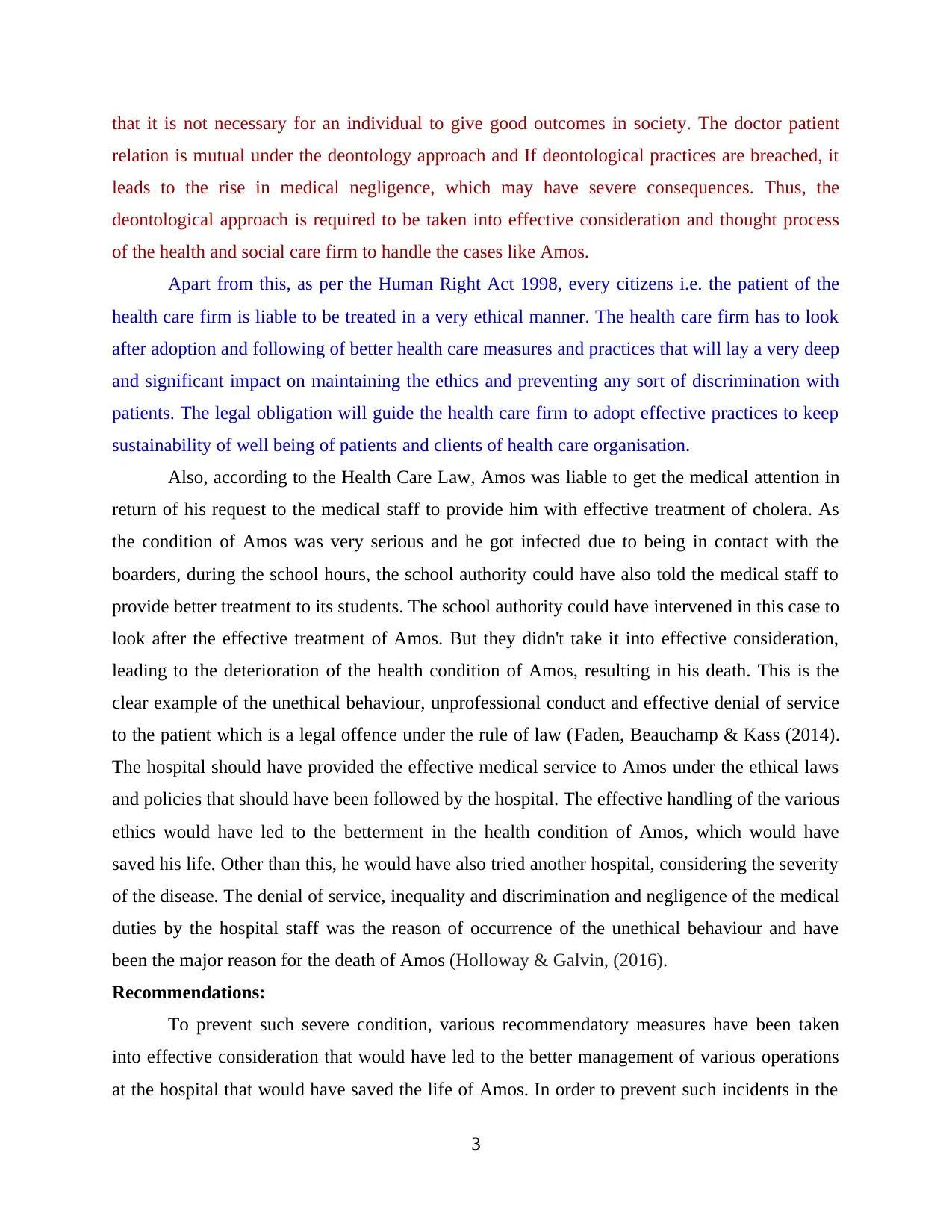
that it is not necessary for an individual to give good outcomes in society. The doctor patient
relation is mutual under the deontology approach and If deontological practices are breached, it
leads to the rise in medical negligence, which may have severe consequences. Thus, the
deontological approach is required to be taken into effective consideration and thought process
of the health and social care firm to handle the cases like Amos.
Apart from this, as per the Human Right Act 1998, every citizens i.e. the patient of the
health care firm is liable to be treated in a very ethical manner. The health care firm has to look
after adoption and following of better health care measures and practices that will lay a very deep
and significant impact on maintaining the ethics and preventing any sort of discrimination with
patients. The legal obligation will guide the health care firm to adopt effective practices to keep
sustainability of well being of patients and clients of health care organisation.
Also, according to the Health Care Law, Amos was liable to get the medical attention in
return of his request to the medical staff to provide him with effective treatment of cholera. As
the condition of Amos was very serious and he got infected due to being in contact with the
boarders, during the school hours, the school authority could have also told the medical staff to
provide better treatment to its students. The school authority could have intervened in this case to
look after the effective treatment of Amos. But they didn't take it into effective consideration,
leading to the deterioration of the health condition of Amos, resulting in his death. This is the
clear example of the unethical behaviour, unprofessional conduct and effective denial of service
to the patient which is a legal offence under the rule of law (Faden, Beauchamp & Kass (2014).
The hospital should have provided the effective medical service to Amos under the ethical laws
and policies that should have been followed by the hospital. The effective handling of the various
ethics would have led to the betterment in the health condition of Amos, which would have
saved his life. Other than this, he would have also tried another hospital, considering the severity
of the disease. The denial of service, inequality and discrimination and negligence of the medical
duties by the hospital staff was the reason of occurrence of the unethical behaviour and have
been the major reason for the death of Amos (Holloway & Galvin, (2016).
Recommendations:
To prevent such severe condition, various recommendatory measures have been taken
into effective consideration that would have led to the better management of various operations
at the hospital that would have saved the life of Amos. In order to prevent such incidents in the
3
relation is mutual under the deontology approach and If deontological practices are breached, it
leads to the rise in medical negligence, which may have severe consequences. Thus, the
deontological approach is required to be taken into effective consideration and thought process
of the health and social care firm to handle the cases like Amos.
Apart from this, as per the Human Right Act 1998, every citizens i.e. the patient of the
health care firm is liable to be treated in a very ethical manner. The health care firm has to look
after adoption and following of better health care measures and practices that will lay a very deep
and significant impact on maintaining the ethics and preventing any sort of discrimination with
patients. The legal obligation will guide the health care firm to adopt effective practices to keep
sustainability of well being of patients and clients of health care organisation.
Also, according to the Health Care Law, Amos was liable to get the medical attention in
return of his request to the medical staff to provide him with effective treatment of cholera. As
the condition of Amos was very serious and he got infected due to being in contact with the
boarders, during the school hours, the school authority could have also told the medical staff to
provide better treatment to its students. The school authority could have intervened in this case to
look after the effective treatment of Amos. But they didn't take it into effective consideration,
leading to the deterioration of the health condition of Amos, resulting in his death. This is the
clear example of the unethical behaviour, unprofessional conduct and effective denial of service
to the patient which is a legal offence under the rule of law (Faden, Beauchamp & Kass (2014).
The hospital should have provided the effective medical service to Amos under the ethical laws
and policies that should have been followed by the hospital. The effective handling of the various
ethics would have led to the betterment in the health condition of Amos, which would have
saved his life. Other than this, he would have also tried another hospital, considering the severity
of the disease. The denial of service, inequality and discrimination and negligence of the medical
duties by the hospital staff was the reason of occurrence of the unethical behaviour and have
been the major reason for the death of Amos (Holloway & Galvin, (2016).
Recommendations:
To prevent such severe condition, various recommendatory measures have been taken
into effective consideration that would have led to the better management of various operations
at the hospital that would have saved the life of Amos. In order to prevent such incidents in the
3
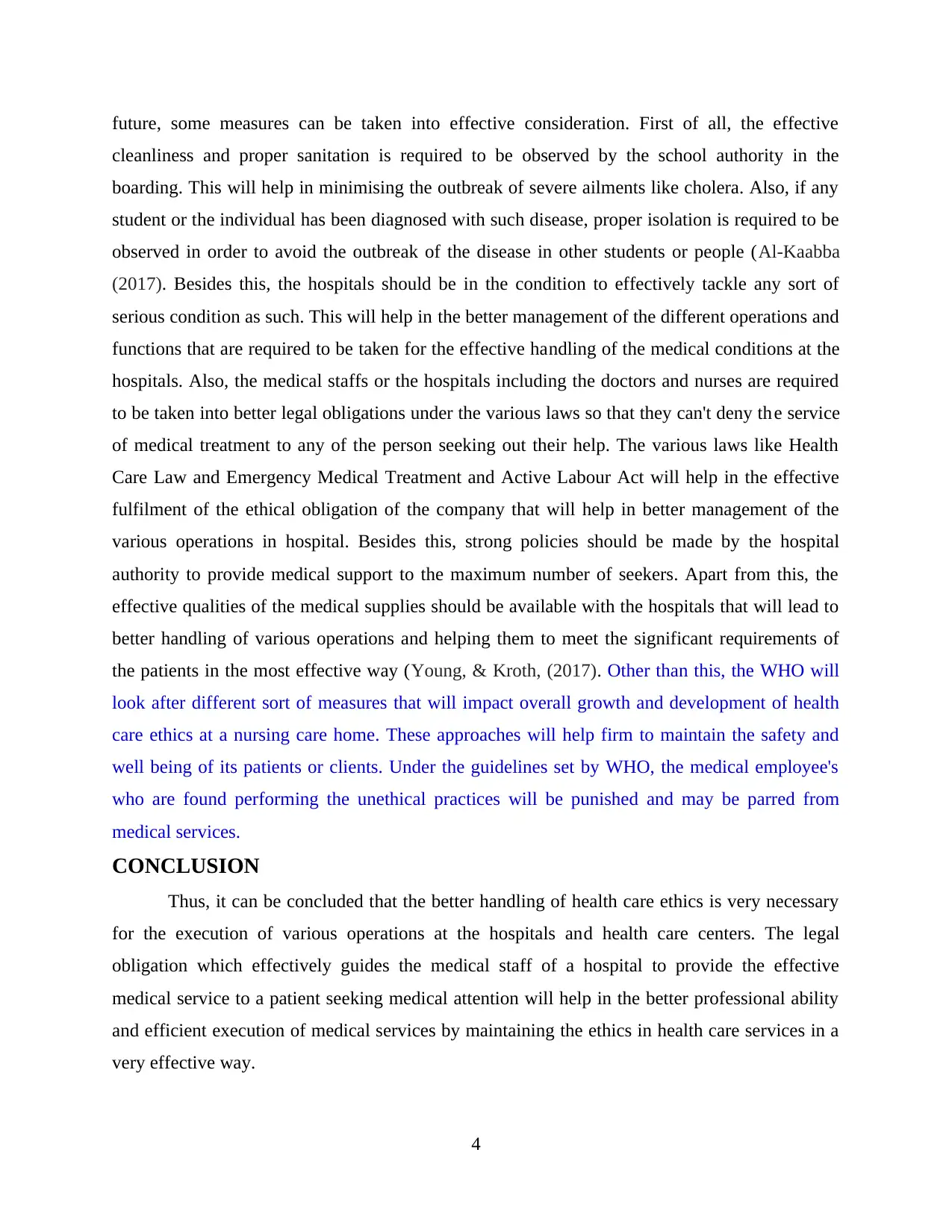
future, some measures can be taken into effective consideration. First of all, the effective
cleanliness and proper sanitation is required to be observed by the school authority in the
boarding. This will help in minimising the outbreak of severe ailments like cholera. Also, if any
student or the individual has been diagnosed with such disease, proper isolation is required to be
observed in order to avoid the outbreak of the disease in other students or people (Al-Kaabba
(2017). Besides this, the hospitals should be in the condition to effectively tackle any sort of
serious condition as such. This will help in the better management of the different operations and
functions that are required to be taken for the effective handling of the medical conditions at the
hospitals. Also, the medical staffs or the hospitals including the doctors and nurses are required
to be taken into better legal obligations under the various laws so that they can't deny th e service
of medical treatment to any of the person seeking out their help. The various laws like Health
Care Law and Emergency Medical Treatment and Active Labour Act will help in the effective
fulfilment of the ethical obligation of the company that will help in better management of the
various operations in hospital. Besides this, strong policies should be made by the hospital
authority to provide medical support to the maximum number of seekers. Apart from this, the
effective qualities of the medical supplies should be available with the hospitals that will lead to
better handling of various operations and helping them to meet the significant requirements of
the patients in the most effective way (Young, & Kroth, (2017). Other than this, the WHO will
look after different sort of measures that will impact overall growth and development of health
care ethics at a nursing care home. These approaches will help firm to maintain the safety and
well being of its patients or clients. Under the guidelines set by WHO, the medical employee's
who are found performing the unethical practices will be punished and may be parred from
medical services.
CONCLUSION
Thus, it can be concluded that the better handling of health care ethics is very necessary
for the execution of various operations at the hospitals and health care centers. The legal
obligation which effectively guides the medical staff of a hospital to provide the effective
medical service to a patient seeking medical attention will help in the better professional ability
and efficient execution of medical services by maintaining the ethics in health care services in a
very effective way.
4
cleanliness and proper sanitation is required to be observed by the school authority in the
boarding. This will help in minimising the outbreak of severe ailments like cholera. Also, if any
student or the individual has been diagnosed with such disease, proper isolation is required to be
observed in order to avoid the outbreak of the disease in other students or people (Al-Kaabba
(2017). Besides this, the hospitals should be in the condition to effectively tackle any sort of
serious condition as such. This will help in the better management of the different operations and
functions that are required to be taken for the effective handling of the medical conditions at the
hospitals. Also, the medical staffs or the hospitals including the doctors and nurses are required
to be taken into better legal obligations under the various laws so that they can't deny th e service
of medical treatment to any of the person seeking out their help. The various laws like Health
Care Law and Emergency Medical Treatment and Active Labour Act will help in the effective
fulfilment of the ethical obligation of the company that will help in better management of the
various operations in hospital. Besides this, strong policies should be made by the hospital
authority to provide medical support to the maximum number of seekers. Apart from this, the
effective qualities of the medical supplies should be available with the hospitals that will lead to
better handling of various operations and helping them to meet the significant requirements of
the patients in the most effective way (Young, & Kroth, (2017). Other than this, the WHO will
look after different sort of measures that will impact overall growth and development of health
care ethics at a nursing care home. These approaches will help firm to maintain the safety and
well being of its patients or clients. Under the guidelines set by WHO, the medical employee's
who are found performing the unethical practices will be punished and may be parred from
medical services.
CONCLUSION
Thus, it can be concluded that the better handling of health care ethics is very necessary
for the execution of various operations at the hospitals and health care centers. The legal
obligation which effectively guides the medical staff of a hospital to provide the effective
medical service to a patient seeking medical attention will help in the better professional ability
and efficient execution of medical services by maintaining the ethics in health care services in a
very effective way.
4
⊘ This is a preview!⊘
Do you want full access?
Subscribe today to unlock all pages.

Trusted by 1+ million students worldwide
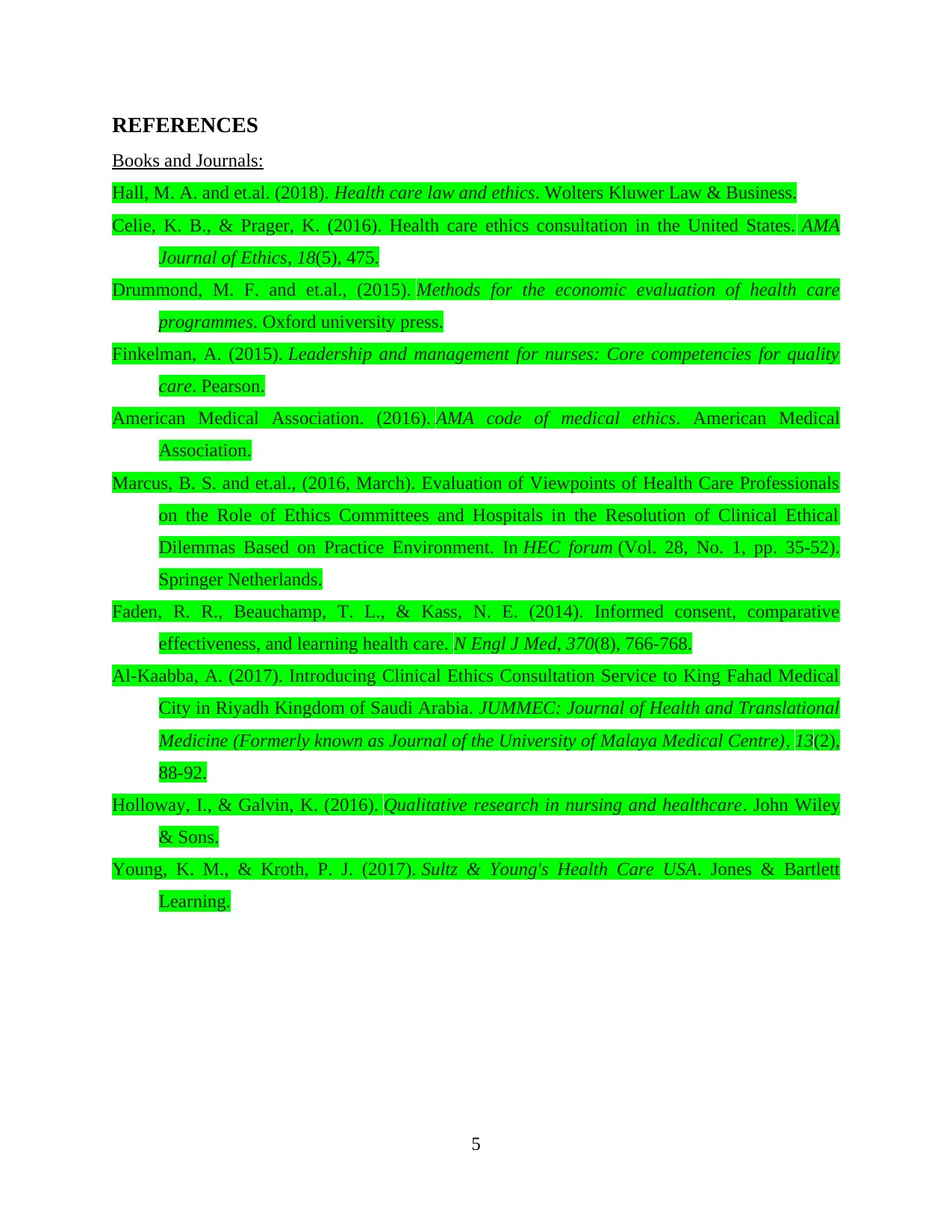
REFERENCES
Books and Journals:
Hall, M. A. and et.al. (2018). Health care law and ethics. Wolters Kluwer Law & Business.
Celie, K. B., & Prager, K. (2016). Health care ethics consultation in the United States. AMA
Journal of Ethics, 18(5), 475.
Drummond, M. F. and et.al., (2015). Methods for the economic evaluation of health care
programmes. Oxford university press.
Finkelman, A. (2015). Leadership and management for nurses: Core competencies for quality
care. Pearson.
American Medical Association. (2016). AMA code of medical ethics. American Medical
Association.
Marcus, B. S. and et.al., (2016, March). Evaluation of Viewpoints of Health Care Professionals
on the Role of Ethics Committees and Hospitals in the Resolution of Clinical Ethical
Dilemmas Based on Practice Environment. In HEC forum (Vol. 28, No. 1, pp. 35-52).
Springer Netherlands.
Faden, R. R., Beauchamp, T. L., & Kass, N. E. (2014). Informed consent, comparative
effectiveness, and learning health care. N Engl J Med, 370(8), 766-768.
Al-Kaabba, A. (2017). Introducing Clinical Ethics Consultation Service to King Fahad Medical
City in Riyadh Kingdom of Saudi Arabia. JUMMEC: Journal of Health and Translational
Medicine (Formerly known as Journal of the University of Malaya Medical Centre), 13(2),
88-92.
Holloway, I., & Galvin, K. (2016). Qualitative research in nursing and healthcare. John Wiley
& Sons.
Young, K. M., & Kroth, P. J. (2017). Sultz & Young's Health Care USA. Jones & Bartlett
Learning.
5
Books and Journals:
Hall, M. A. and et.al. (2018). Health care law and ethics. Wolters Kluwer Law & Business.
Celie, K. B., & Prager, K. (2016). Health care ethics consultation in the United States. AMA
Journal of Ethics, 18(5), 475.
Drummond, M. F. and et.al., (2015). Methods for the economic evaluation of health care
programmes. Oxford university press.
Finkelman, A. (2015). Leadership and management for nurses: Core competencies for quality
care. Pearson.
American Medical Association. (2016). AMA code of medical ethics. American Medical
Association.
Marcus, B. S. and et.al., (2016, March). Evaluation of Viewpoints of Health Care Professionals
on the Role of Ethics Committees and Hospitals in the Resolution of Clinical Ethical
Dilemmas Based on Practice Environment. In HEC forum (Vol. 28, No. 1, pp. 35-52).
Springer Netherlands.
Faden, R. R., Beauchamp, T. L., & Kass, N. E. (2014). Informed consent, comparative
effectiveness, and learning health care. N Engl J Med, 370(8), 766-768.
Al-Kaabba, A. (2017). Introducing Clinical Ethics Consultation Service to King Fahad Medical
City in Riyadh Kingdom of Saudi Arabia. JUMMEC: Journal of Health and Translational
Medicine (Formerly known as Journal of the University of Malaya Medical Centre), 13(2),
88-92.
Holloway, I., & Galvin, K. (2016). Qualitative research in nursing and healthcare. John Wiley
& Sons.
Young, K. M., & Kroth, P. J. (2017). Sultz & Young's Health Care USA. Jones & Bartlett
Learning.
5
1 out of 7
Related Documents
Your All-in-One AI-Powered Toolkit for Academic Success.
+13062052269
info@desklib.com
Available 24*7 on WhatsApp / Email
![[object Object]](/_next/static/media/star-bottom.7253800d.svg)
Unlock your academic potential
Copyright © 2020–2026 A2Z Services. All Rights Reserved. Developed and managed by ZUCOL.




